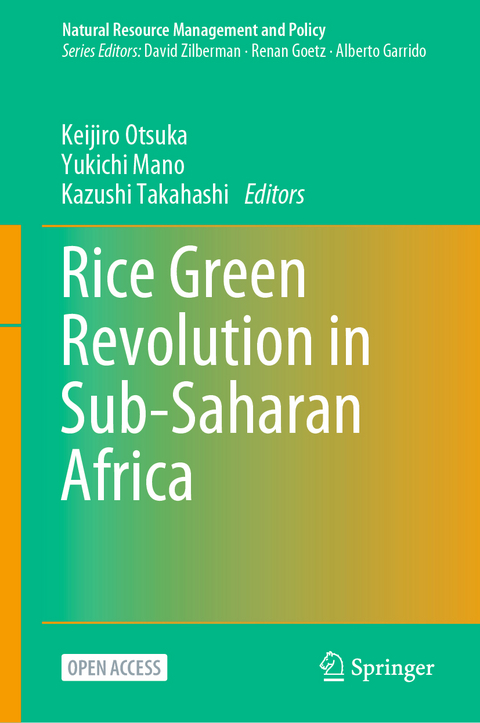
Rice Green Revolution in Sub-Saharan Africa
Springer Verlag, Singapore
978-981-19-8045-9 (ISBN)
Keijiro Otsuka is a professor of development economics at the Graduate School of Economics, Kobe University and an executive senior research fellow at the Institute of Developing Economies - JETRO, in Japan since 2016. He received Ph.D. in economics from the University of Chicago in 1979. Prior to joining Kobe University, he was a professor at the National Graduate Institute for Policy Studies from 2001 to 2016 and a core member of the World Development Report: Jobs at the World Bank from 2011 to 2012. He was a chairman of the Board of Trustees of the International Rice Research Institute from 2004 to 2007, the president of the International Association of Agricultural Economists from 2009 to 2012, and is currently the president of the Japanese Association for Development Economics. He majors in Green Revolution, land tenure and land tenancy, natural resource management, poverty reduction, and industrial development in Asia and sub-Saharan Africa. He has published 146 articles in internationally renowned journals and is a coauthor or coeditor of 26 books. He received Purple Ribbon Medal from the Japanese Government in 2010 and is a member of the Japan Academy since 2018. He also received the Quality of Research Discovery Award from the American Agricultural Economics Association in 1992, Nikkei Outstanding Book Publication Award from the Japan Economic Journal in 1995 and 2004, and the Best Journal Article Award from the Agricultural Economics Society of Japan in 1999. He was selected as an honorary life member of International Association of Agricultural Economists in 2012, a fellow of Agricultural and Applied Economics Association in 2013, and a distinguished fellow of African Association of Agricultural Economists in 2013. Yukichi Mano is a professor at Hitotsubashi University, Japan, and is a fellow at Tokyo Center for Economic Research (TCER). Before joining Hitotsubashi University, he was an assistant professor at National Graduate Institute for Policy Studies (GRIPS) from 2007 to 2012. He received B.A. in Economics and Master in Social Science from Tokyo Metropolitan University, and his Master and Ph.D. in Economics from the University of Chicago in 2007. His scholarly interests include agricultural technology adoption, horticulture and high-valued crop production, business and management training (KAIZEN), human capital investment, migration and remittance, and universal health coverage in Asia and sub-Saharan Africa. He has published his research mainly in agricultural and development economics journals, including agricultural economics, world development, Journal of African Economies, Journal of Development Studies, and Journal of Population Economics. Kazushi Takahashi is a professor at the National Graduate Institute for Policy Studies (GRIPS) and is a director of the GRIPS Global Governance Program, Japan. Before joining GRIPS, he was an associate professorand a professor at Sophia University from 2015 to 2019, a visiting research fellow at the Charles H. Dyson School of Applied Economics and Management of Cornell University from 2010 to 2012, and a research fellow at the Institute of Developing Economies-Japan External Trade Organization from 2006 to 2015. He received his B.A. in Policy Management from Keio University and both his Master in International Development Studies and Ph.D. in Development Economics from GRIPS. His scholarly interests include agricultural technology adoption, rural poverty dynamics, microfinance, human capital investment, and aid effectiveness in Asia and sub-Saharan African countries. He has published his research in major agricultural and development economics journals, such as American Journal of Agricultural Economics, Developing Economies, Economic Development and Cultural Change, World Bank Economic Review, and World Development. He serves on the editorial board of Developing Economies in 2009–2010 and 2012–2015 as well as the associate editor of Food Security from 2021.
Chapter 1. The Rice Green Revolution in sub-Saharan Africa: Issues and opportunities.- Chapter 2. The Role of Extension in the Green Revolution.- Chapter 3. The Case of Cote d’Ivoire: Learning from Experts of Rice Farming Management and Peer Farmers about Rice Production.- Chapter 4. The Case of Tanzania: Effectiveness of Management Training on Rice Framing and Farmer-to-Farmer Extension.- Chapter 5. The Case of Uganda: Long-term and Spillover Effects of Rice Production Training.- Chapter 6. The Case of Mozambique: The Importance of Management Training for Rice Farming in Rainfed Areas.- Chapter 7. Intensification of Rice Farming: The Role of Mechanization and Irrigation.- Chapter 8. Mechanization in Cote d'Ivoire: Impacts of Tractorization on Agricultural Intensification.- Chapter 9. Mechanization in Tanzania: Impact of Tractorization on Intensification and Extensification of Rice Farming.- Chapter 10. Irrigation in Kenya: Economic Viability of Large-scale Irrigation Construction.- Chapter 11. Irrigation Scheme Size and its Relationship to Investment Return: The Case of Senegal River Valley.- Chapter 12. Rice Milling in Kenya: An Inquiry into the Process of Upgrading Rice Milling Services.- Chapter 13. Toward Quality Upgrading of Rice Production in SSA:Experimental Evidence from Northern Ghana.- Chapter 14. Toward a Full-Fledged Rice Green Revolution in Sub-Saharan Africa.
| Erscheinungsdatum | 04.03.2023 |
|---|---|
| Reihe/Serie | Natural Resource Management and Policy ; 56 |
| Zusatzinfo | 21 Illustrations, color; 6 Illustrations, black and white; X, 309 p. 27 illus., 21 illus. in color. |
| Verlagsort | Singapore |
| Sprache | englisch |
| Maße | 155 x 235 mm |
| Themenwelt | Sozialwissenschaften ► Soziologie ► Spezielle Soziologien |
| Wirtschaft ► Volkswirtschaftslehre | |
| Weitere Fachgebiete ► Land- / Forstwirtschaft / Fischerei | |
| Schlagworte | food security • Large-scale irrigation • open access • Rice cultivation training • Rice Green Revolution • Rice milling and rice quality • Role of mechanization • Sustainable Growth |
| ISBN-10 | 981-19-8045-4 / 9811980454 |
| ISBN-13 | 978-981-19-8045-9 / 9789811980459 |
| Zustand | Neuware |
| Informationen gemäß Produktsicherheitsverordnung (GPSR) | |
| Haben Sie eine Frage zum Produkt? |
aus dem Bereich


